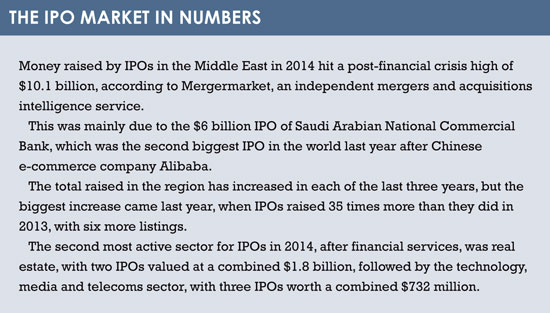 The low oil price could suppress initial public offerings (IPOs), causing companies to postpone or cancel plans to list. But some Middle East markets will be more resilient than others, finds George Mitton.
The low oil price could suppress initial public offerings (IPOs), causing companies to postpone or cancel plans to list. But some Middle East markets will be more resilient than others, finds George Mitton.
The falling oil price in late 2014 was torture for equity investors in the Gulf countries. In the last three months of the year, when the Brent crude price began its collapse, the GCC Composite index from compiler S&P fell more than 20%. Such a dramatic drop was frightening for the many companies in the region considering listing. No one wants to go public only to see the value of their stock plummet, and with oil prices expected to stay low, and volatility again a feature of regional stock exchanges, anecdotal evidence suggests many companies are delaying or postponing plans for initial public offerings (IPOs).
The expected decline in IPOs is discouraging for equity managers in the region, some of whom had predicted 2015 would be a bumper year for listings.
It is not all bad news, however. Some Gulf markets are expected to be more resilient than others.
BAD SENTIMENT
The UAE is expected to be among the worst affected by negative IPO sentiment this year, which is ironic given that only a few months ago, there was widespread optimism about new listings.
“In the last six months of 2014 we had a buzz about a lot of listings,” says Samer Abdel Kader, head of SEI Investments (Middle East). “But when the market drops and becomes volatile, as in the last couple of months, it puts off a lot of the shareholders. Nobody wants to list and see the value of their shares drop 25%.”
The buzz in the second half of last year was so frenzied, he says, that it reminded him of the months leading up to the financial crisis. In 2007 and early 2008, UAE companies were announcing IPO plans “on an almost monthly basis”. Then came the credit crunch, which torpedoed regional markets and swiftly ended the run of IPOs. Today, it is the plunge in the oil price that is causing plans to be abandoned.
The outlook for IPOs is particularly gloomy in the UAE because the country’s stock markets, the Abu Dhabi Securities Exchange and the Dubai Financial Market, are highly dependent on investor sentiment rather than fundamental analysis. As in other Gulf markets, most of the traders in the market are retail investors, many of whom use leverage to enlarge their bets. The market tends to exhibit big swings and, at times, is subject to indiscriminate selling. Given that the low oil price is likely to suppress investor sentiment for some months yet, the prospect of a pick up in IPOs is remote.
 In this environment, says Abdel Kader, is it unfortunately quite possible that some UAE companies will choose to list outside the region – for instance, on the London Stock Exchange. The UK stock market has been less volatile than the UAE markets over the past ten years and is not as vulnerable to the low oil price. For shareholders, listing in the UK feels safer.
In this environment, says Abdel Kader, is it unfortunately quite possible that some UAE companies will choose to list outside the region – for instance, on the London Stock Exchange. The UK stock market has been less volatile than the UAE markets over the past ten years and is not as vulnerable to the low oil price. For shareholders, listing in the UK feels safer.
“This year looks to be disappointing for IPOs and the ones brave enough will probably do their listings in London,” Abdul Kader says.
RESILIENT
Not everyone in the region is so pessimistic about the IPO pipeline. Steven Drake, a partner at consultancy PwC, says that unlike in the UAE, companies in Saudi Arabia are likely to push on with plans to list despite the weak stock markets. This is not because the Saudi stock exchange, the Tadawul, has been any stronger than the UAE markets lately. In fact, the Saudi broad market index from S&P fell further than the Gulf Cooperation Council markets in general in the last quarter of 2014, suffering a 25% decline in the three-month period. However, in Saudi Arabia, he says, “there isn’t as much emphasis on valuations”.
Why should Saudi companies be less perturbed by low valuations than their peers in the UAE? One reason, says Drake, is the long time it takes the country’s regulator, the Capital Market Authority (CMA), to approve potential listings. Given that it can take between six and 12 months to complete the CMA’s listing process, companies have tended to worry less about short-term stock movements. In addition, the CMA is not afraid to quash IPOs if its conditions are not met. Several companies have had their applications rejected and been forced to reapply because the CMA wasn’t satisfied it had all the paperwork needed.
“The IPO market in Saudi Arabia tends to be quite resilient,” says Drake. “We haven’t necessarily seen companies stepping back because valuations are lightly down. That’s a feature of the market. The companies know there is a regulatory process to go through and, by the time they’ve done it, the market might have rebounded.”
In the past, the lengthy approval times seen at the CMA have been criticised in some quarters – for instance, by equity managers who would like to see more stocks on the exchange. But Drake says it is reasonable for the regulator to be fastidious. The Saudi Arabian market is not as mature as US or European markets and regulations are not as well developed. In this environment, it is natural for the CMA to take a tougher stance than the “light touch” regulators elsewhere in the world.
BRIGHT SPOTS
There are other reasons to be optimistic about the Saudi market, even in a world of low oil prices. One is the planned opening of the Saudi stock exchange to qualified foreign investors, which is due to take place in the first half of this year. Investment will be confined to institutions that meet a series of conditions, such as having $5 billion under management. In addition, a series of foreign ownership limits will control how much stock foreign investors can own. Nevertheless, the opening is expected to bring an inflow of foreign money that ought to buoy up equity prices.
“That inflow of foreign capital brings more liquidity,” says Drake, “and because it is institutional cash, it typically has a stabilising effect on equity prices, making it more attractive to list.”
Stock exchanges elsewhere in the Gulf will be less exciting to watch than the Tadawul because they tend to host fewer listings, and those companies that do seek IPOs tend to be state-owned. The last major listing in Qatar, for instance, was a unit of state-owned Qatar Petroleum.
“I have heard talk of a return to the IPO market in Qatar, but we generally haven’t seen it,” says Drake. “And in Oman, the only ones we have seen tend to be government-driven.”
There is, however, another bright spot for Middle East investors: Egypt. As an oil-importing country, Egypt is, if anything, aided by the low oil price, which allows the government to reduce fuel subsidies. In addition, the country is enjoying relative stability under the rule of President Abdel Fattah el-Sisi.
Drake, whose firm worked recently on two transactions in Egypt, says shareholders both in and outside Egypt are taking the chance to realise value in Egyptian enterprises now that the worst turmoil of the revolution seems to be in the past.
IPOs are a good way of cashing in on profitable businesses, and Drake sees no sign of this trend slowing.
©2015 funds global mena
